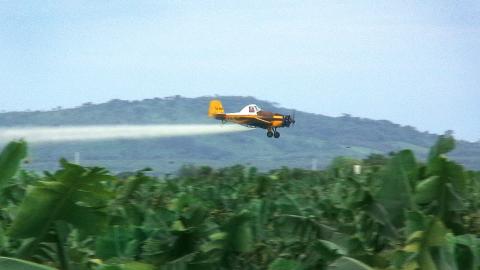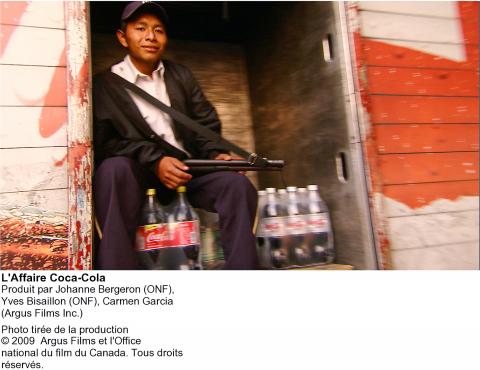Bananas, Coca-Cola and gold. The three commodities have one thing in common: a dark side, which is being exposed and examined by the four documentary films selected for the Fair Trade Film Festival (公平貿易影展). Celebrating its third edition this year, the festival is a two-month-long touring event that begins tomorrow and will travel to more than a dozen cafes, health shops, educational centers as well as arts and cultural spaces across the country.
The festival is organized by the Taiwan Fairtrade Association (台灣公平貿易協會) with an aim to build communication and generate discussions about inequities and injustice resulting from the global production and trading systems. Established in 2010 as the first organization promoting fair trade in Taiwan, the association sets its primary goal as educating the general public about the principles and practices of fair trade as a social movement that helps producers in poor countries improve their difficult, often hazardous conditions and achieve wider sustainability.
“To fair trade activists, buying organic products is not so much about living healthily as safeguarding human rights,” says Karen Yu (余宛如), who serves as a council member of the association.

Photo Courtesy of Fair Trade Taiwan
The violation of human rights is illustrated in Swedish director Fredrik Gertten’s 2009 Bananas, which tells the story of 12 banana plantation workers in Nicaragua who are suing Dole Food Company, one of the world’s biggest fruit and vegetable corporations, for knowingly exposing them to dibromochloropropane (DBCP), a pesticide known to cause sterility. Banned in the US in the 1970s, the pesticide continued to be used by Dole in Nicaragua until the 1980s.
The film was selected to compete at the 2009 Los Angeles Film Festival, but the festival organizers later removed it after Dole took action to stop the film from gaining viewership. And exactly how far the American multi-national has gone to use its corporate power to suppress independent film and its makers subsequently becomes the story in Gertten’s Big Boys Gone Bananas!.
Meanwhile, dark secrets behind the Coca-Cola empire are revealed in The Coca-Cola Case, which follows two American lawyers and one activist as they wage a legal and human rights battle against the US beverage giant, attempting to hold it accountable for abduction, torture and murder of union leaders trying to improve working conditions in Colombia, Guatemala and Turkey.

Photo Courtesy of Fair Trade Taiwan
Moving to gold mines. The Business of Gold in Guatemala examines conflicts and harm inflicted on communities and the environment resulting from mine exploration in Central America, where the governments give out mining concessions to international mining companies. The plot focuses on the collective resistance by Mayan indigenous groups in Guatemala against Canadian transnational company Goldcorp.
For Yu, film is an effective way to further understanding and bring about changes. “We want to tell the public that there are lots of problems and controversies surrounding the way our food is grown, processed and distributed. Through the films, we want to start dialogue on how we can make a better choice,” she says.
The touring festival will open tomorrow at Apoozi (阿布籽香草工坊) in Tamsui District (淡水區), New Taipei City, and travel across the country to hold screenings in Hsinchu County, Greater Taichung, Greater Kaohsiung, Hualien County and Taitung County until July 28. All participating shops, businesses and organizations share the same values and ideas about fair trade, and screenings are free. More information about the schedules and locations can be found at www.okogreen.com.tw/blog/?p=2669.

Taiwan has next to no political engagement in Myanmar, either with the ruling military junta nor the dozens of armed groups who’ve in the last five years taken over around two-thirds of the nation’s territory in a sprawling, patchwork civil war. But early last month, the leader of one relatively minor Burmese revolutionary faction, General Nerdah Bomya, who is also an alleged war criminal, made a low key visit to Taipei, where he met with a member of President William Lai’s (賴清德) staff, a retired Taiwanese military official and several academics. “I feel like Taiwan is a good example of

March 2 to March 8 Gunfire rang out along the shore of the frontline island of Lieyu (烈嶼) on a foggy afternoon on March 7, 1987. By the time it was over, about 20 unarmed Vietnamese refugees — men, women, elderly and children — were dead. They were hastily buried, followed by decades of silence. Months later, opposition politicians and journalists tried to uncover what had happened, but conflicting accounts only deepened the confusion. One version suggested that government troops had mistakenly killed their own operatives attempting to return home from Vietnam. The military maintained that the

Before the last section of the round-the-island railway was electrified, one old blue train still chugged back and forth between Pingtung County’s Fangliao (枋寮) and Taitung (台東) stations once a day. It was so slow, was so hot (it had no air conditioning) and covered such a short distance, that the low fare still failed to attract many riders. This relic of the past was finally retired when the South Link Line was fully electrified on Dec. 23, 2020. A wave of nostalgia surrounded the termination of the Ordinary Train service, as these train carriages had been in use for decades

Lori Sepich smoked for years and sometimes skipped taking her blood pressure medicine. But she never thought she’d have a heart attack. The possibility “just wasn’t registering with me,” said the 64-year-old from Memphis, Tennessee, who suffered two of them 13 years apart. She’s far from alone. More than 60 million women in the US live with cardiovascular disease, which includes heart disease as well as stroke, heart failure and atrial fibrillation. And despite the myth that heart attacks mostly strike men, women are vulnerable too. Overall in the US, 1 in 5 women dies of cardiovascular disease each year, 37,000 of them